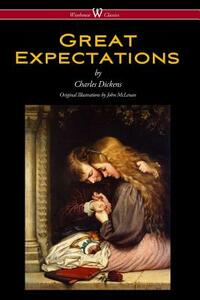You need to sign in or sign up before continuing.
Take a photo of a barcode or cover
5.49k reviews for:
Great Expectations (Wisehouse Classics - with the original Illustrations by John McLenan 1860)
Charles Dickens
5.49k reviews for:
Great Expectations (Wisehouse Classics - with the original Illustrations by John McLenan 1860)
Charles Dickens
4½ stars. I especially loved the scenes set on the Kent marshes (for obvious reasons!).
adventurous
challenging
emotional
reflective
slow-paced
Plot or Character Driven:
Character
Strong character development:
Yes
Loveable characters:
Complicated
Diverse cast of characters:
No
Flaws of characters a main focus:
Yes
emotional
mysterious
sad
slow-paced
Plot or Character Driven:
A mix
Strong character development:
Yes
Loveable characters:
Yes
Diverse cast of characters:
No
Flaws of characters a main focus:
Yes
challenging
mysterious
slow-paced
Plot or Character Driven:
Plot
Strong character development:
Yes
Loveable characters:
Complicated
Diverse cast of characters:
No
Flaws of characters a main focus:
Yes
I had to read this book so deeply I had a dream about
Spoiler
encounterings happening over and over again like Trabb's Boy and Pip had ;-;
emotional
reflective
slow-paced
Plot or Character Driven:
Character
Strong character development:
Yes
Loveable characters:
Yes
Diverse cast of characters:
Yes
Flaws of characters a main focus:
Yes
dark
inspiring
reflective
medium-paced
Plot or Character Driven:
Character
Strong character development:
Yes
Loveable characters:
Yes
Diverse cast of characters:
No
Flaws of characters a main focus:
Yes
I only read one Dickens book before I started on the “1000 books to read before you die” project. And while A Tale of Two Cities is pretty great, in High School it was just a book to read. But now I’ve read both Great Expectations and Martin Chuzzlewit, and enjoyed both immensely.
Great Expectations tells the story of a young man, a blacksmith’s apprentice, who comes into the eponymous inheritance from an anonymous benefactor and proceeds to learn important lessons about friendship, life, and love. Delightful. Some additional thoughts:
* Now that I’ve read this, I’m going to have to return to Jasper Fforde’s Thursday Next series to discover the army of Havishams again. Her creepy, disturbing, pitiful existence doesn’t come through very clearly if you, ahem, don’t get the references. And by the way, the table full of rotted food with creepy crawly bugs all over it … YUCK.
* Once again, I’m surprised by the humor sprinkled throughout the book. It’s not as overt as the humor in Chuzz, but Pip’s descriptions of his interactions and his understated way of saying he dislikes things work really well.
* Dickens often gets flack for his constructed stories, the way that nearly every character who appears will later be very important. One might call it an over-reliance on deus ex machina. But I’m reminded of formula detective shows like Bones or Castle. The biggest flaw in these shows is that for the mystery to seem both mysterious and satisfying, the suspect needs to be someone we don’t suspect while still being someone we’ve encountered before. So most of the time, the villain is the first or second witness they interview, someone beyond suspicion early on. Dickens uses this strategy, bringing back characters from early in the narrative to play important roles later.
* I’ve commented before on the fact that audiobooks created an association between the book and the place or activity where you read them. I read the last half of this book while painting my house over the weekend (long story). I’ll associate the big reveals in the last chapter with slopping Killz on my old-as-dirt window sills.
And Mark Smith does a great job with the book, just as he did with Captain’s Courageous. My only complaint (and it’s a pet peeve more than anything) is that he says domain with the stress on the first syllable, DO-main, rather than on the second syllable, do-MAIN. Otherwise, his characterization, diction, pacing, inflection, and emotion are all excellent. Particularly good in this reading were his voices for Joe and for Wemmick.
Great Expectations tells the story of a young man, a blacksmith’s apprentice, who comes into the eponymous inheritance from an anonymous benefactor and proceeds to learn important lessons about friendship, life, and love. Delightful. Some additional thoughts:
* Now that I’ve read this, I’m going to have to return to Jasper Fforde’s Thursday Next series to discover the army of Havishams again. Her creepy, disturbing, pitiful existence doesn’t come through very clearly if you, ahem, don’t get the references. And by the way, the table full of rotted food with creepy crawly bugs all over it … YUCK.
* Once again, I’m surprised by the humor sprinkled throughout the book. It’s not as overt as the humor in Chuzz, but Pip’s descriptions of his interactions and his understated way of saying he dislikes things work really well.
* Dickens often gets flack for his constructed stories, the way that nearly every character who appears will later be very important. One might call it an over-reliance on deus ex machina. But I’m reminded of formula detective shows like Bones or Castle. The biggest flaw in these shows is that for the mystery to seem both mysterious and satisfying, the suspect needs to be someone we don’t suspect while still being someone we’ve encountered before. So most of the time, the villain is the first or second witness they interview, someone beyond suspicion early on. Dickens uses this strategy, bringing back characters from early in the narrative to play important roles later.
* I’ve commented before on the fact that audiobooks created an association between the book and the place or activity where you read them. I read the last half of this book while painting my house over the weekend (long story). I’ll associate the big reveals in the last chapter with slopping Killz on my old-as-dirt window sills.
And Mark Smith does a great job with the book, just as he did with Captain’s Courageous. My only complaint (and it’s a pet peeve more than anything) is that he says domain with the stress on the first syllable, DO-main, rather than on the second syllable, do-MAIN. Otherwise, his characterization, diction, pacing, inflection, and emotion are all excellent. Particularly good in this reading were his voices for Joe and for Wemmick.
I sort of wanted to give this 4 stars but I don’t think it’s quite there.
Best part of the book was undoubtedly George Bernard Shaw’s afterword- a beautifully written piece that is about as much about Great Expectations as this review has been thus far, covering such a broad range of topics as Marx, Fascism, Democracy, and a host of others, invoking a somewhat convoluted but unyieldingly entertaining socialist critique of Dickens as a socialist, but also authoritarian, writer who preempts his revolutionary peers on a literary scale, but hides his themes within layers so deep within his work as to be almost undetectable (though detected, of course, by Shaw).
I agree with Shaw’s point that the ending, while annoyingly beautifully written, thematically feels like a complete cop out. The rest of the book, however, is intriguing, well-paced (the 550 pages fly by) and wonderfully written. I don’t consider Pip to be an amazing protagonist, but his friends around him add great colour to the book - the Gargery’s, Herbert,Magwitch , and Jaggers.
Estella works as a thematic symbol (until the ending usurps this) but I don’t think any of the female characters are really vividly brought to life. The mad old woman, the simple but kind friend, the unattainable beauty- it all feels a bit like shiny tropes dotting the shelves of the prose.
Like G.B Shaw I consider a few of the ‘coincidences’, far from propagating and then neatly trying up a grand intrigue, to instead be so convenient as to be laughable, and detracts from the otherwise relentless realism. The mystery doesn’t go anywhere, or mean anything, it feels imputed to satisfy the court and upper class intrigue demanded by contemporary readers. Shaw would argue that this is precisely its purpose- Dickens, and his many Children, had a lifestyle that he had to maintain financially, and so satisfying contemporary trends was imperative, even at the potential cost of artistic cohesion.
But all in all, a tight and often funny story that fully deserves it’s status as one of Britain’s best loved novels, by arguably its best loved writer. I look forward to reading more Dickens, as Great Expectations shattered some of my preconceptions and was a great read.
Best part of the book was undoubtedly George Bernard Shaw’s afterword- a beautifully written piece that is about as much about Great Expectations as this review has been thus far, covering such a broad range of topics as Marx, Fascism, Democracy, and a host of others, invoking a somewhat convoluted but unyieldingly entertaining socialist critique of Dickens as a socialist, but also authoritarian, writer who preempts his revolutionary peers on a literary scale, but hides his themes within layers so deep within his work as to be almost undetectable (though detected, of course, by Shaw).
I agree with Shaw’s point that the ending, while annoyingly beautifully written, thematically feels like a complete cop out. The rest of the book, however, is intriguing, well-paced (the 550 pages fly by) and wonderfully written. I don’t consider Pip to be an amazing protagonist, but his friends around him add great colour to the book - the Gargery’s, Herbert,
Estella works as a thematic symbol (until the ending usurps this) but I don’t think any of the female characters are really vividly brought to life. The mad old woman, the simple but kind friend, the unattainable beauty- it all feels a bit like shiny tropes dotting the shelves of the prose.
Like G.B Shaw I consider a few of the ‘coincidences’, far from propagating and then neatly trying up a grand intrigue, to instead be so convenient as to be laughable, and detracts from the otherwise relentless realism. The mystery doesn’t go anywhere, or mean anything, it feels imputed to satisfy the court and upper class intrigue demanded by contemporary readers. Shaw would argue that this is precisely its purpose- Dickens, and his many Children, had a lifestyle that he had to maintain financially, and so satisfying contemporary trends was imperative, even at the potential cost of artistic cohesion.
But all in all, a tight and often funny story that fully deserves it’s status as one of Britain’s best loved novels, by arguably its best loved writer. I look forward to reading more Dickens, as Great Expectations shattered some of my preconceptions and was a great read.






